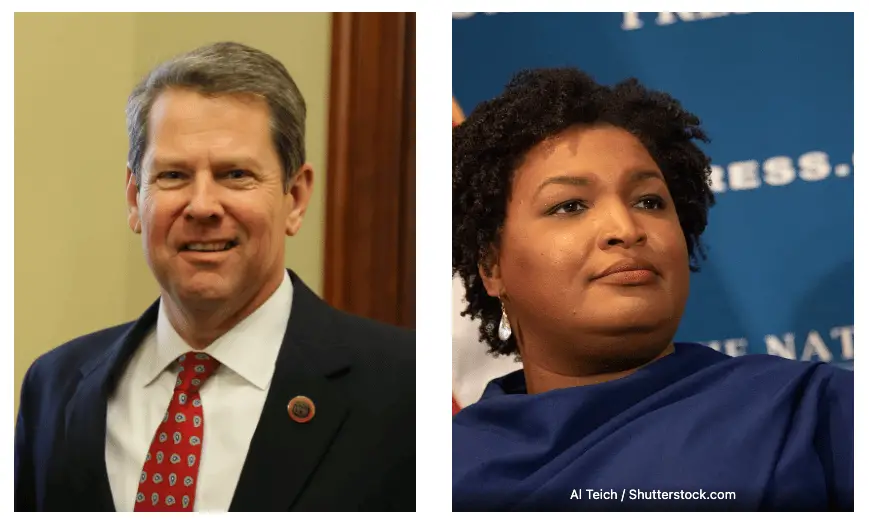Republican Gov. Brian Kemp defended his record on education, crime, the economy, abortion, health care and voting rights Monday night against accusations by Democratic challenger Stacey Abrams that he is not meeting the needs of most Georgians.
During an hourlong debate aired by Georgia Public Broadcasting, Kemp touted his efforts to target street gangs and human trafficking, reopen the state’s economy quickly following the onset of the pandemic and invest in public education.
“We are funding K-12 education in this state more than we ever have per pupil … coming off a recession in the middle of a global pandemic,” he said.
Abrams said Kemp’s championing of legislation allowing Georgians to carry concealed firearms without a permit has made the state more dangerous, while his refusal to expand Medicaid is depriving 500,000 working Georgians of health coverage and putting hospitals out of business.
“We have 19 hospitals at risk of closure, not including the six hospitals that have closed with this governor,” she said.
A central issue in the debate was what the state should be doing with a bulging budget surplus of $6.6 billion.
Kemp said he wants to use the money to fund another income tax rebate similar to the rebate the Republican-controlled General Assembly passed this year, plus a one-time property tax rebate.
“I want to invest it in our children and our families,” Abrams responded, including an $11,000 pay raise for teachers – compared to the $5,000 raises the legislature gave teachers at the governor’s request – and more pre-kindergarten slots to plug a backlog.
“We’ve got the money,” she said.
Kemp said the state is sitting on such a large pile of revenue because Georgia was the first state to reopen its economy early on during the pandemic at a time Abrams was calling for businesses and schools to remain locked down.
“We’re the ones who were fighting for you when Stacey Abrams was not,” Kemp said.
Since then, Georgia has seen more than $30 billion of investment in economic development projects, 74% of which went outside metro Atlanta along with 80,000 jobs, he said.
Abrams said Georgia’s surplus was built largely with federal pandemic relief dollars provided by the Biden administration and congressional Democrats.
“It’s disingenuous to state you did this on your own,” she told Kemp.
Abrams also criticized Kemp for his championing of the “heartbeat” bill in 2019, which banned abortion in Georgia after a fetal heartbeat is detected, typically about six weeks into pregnancy. The law has taken effect since the U.S. Supreme Court in June overturned the 1973 Roe v. Wade decision that made abortion a constitutional right.
“[Kemp] has weakened our privacy rights and women’s rights,” Abrams said. “He has denied women’s rights to reproductive care.”
Kemp took a more moderate position than some other Republican politicians when he said he does not plan to push for any additional restrictions on abortion beyond what’s in the 2019 law. The heartbeat law includes exceptions for rape, incest and the health of the mother.
Abrams also criticized Kemp for backing an education bill the legislature passed this year prohibiting the teaching of certain “divisive concepts” in Georgia schools. The law has prompted local school boards to develop policies for teaching about racism in a way that doesn’t assert the U.S. has been a systemically racist country.
“Teachers are not being able to teach whole history [to] our students,” Abrams said. “They’re not able to tell their children what they need to know.”
Kemp responded that the bill was motivated by complaints from parents tired of students being “indoctrinated in the classroom.”
Abrams also accused the governor of steering legislation restricting voting rights through the legislature, last year’s Senate Bill 202, which requires voters to show a photo ID to vote absentee and limits the number of absentee ballot drop boxes counties can put in their communities.
Kemp pointed to statistics showing record voter turnouts among Republicans and Democrats in last May’s party primaries.
“In Georgia, it’s easy to vote and hard to cheat,” he said.
Libertarian candidate Shane Hazel said the solution to good government in Georgia is less government. As one of a number of examples, he cited the zeal with which police go after otherwise law-abiding citizens for possession of marijuana.
“It’s a medicine,” Hazel said. “It’s something we can add as a business in Georgia.”
This story is available through a news partnership with Capitol Beat News Service, a project of the Georgia Press Educational Foundation.

Dave Williams | Capitol Beat News Service
Dave Williams is the Bureau Chief for Capitol Beat News Service. He is a veteran reporter who has reported on Georgia state government and politics since 1999. Before that, he covered Georgia’s congressional delegation in Washington, D.C.


